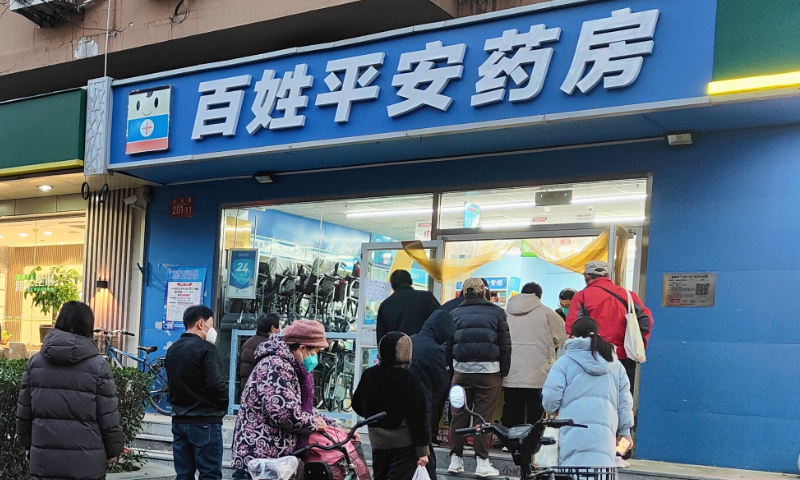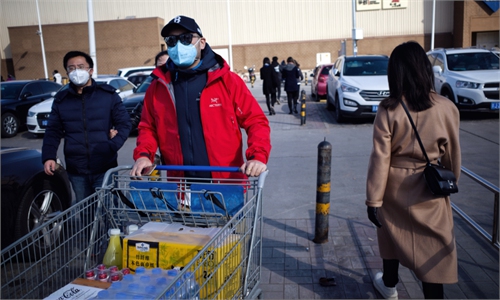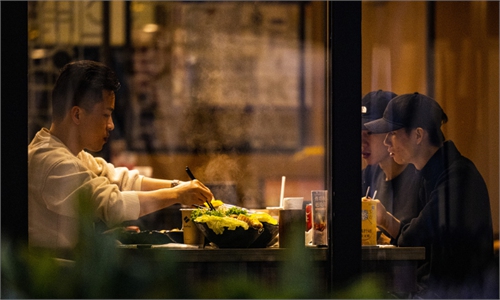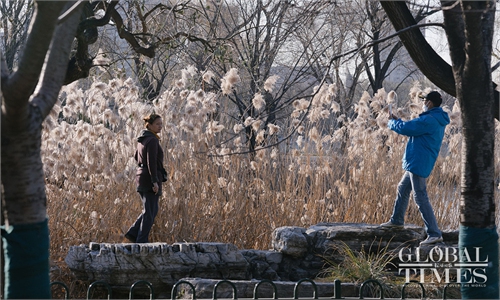
People line at a drug store in Beijing on December 8, 2022. Photo: VCG
Beijing on Monday said the city's medicine supplies have faced great pressure at short notice, as the capital's second-class hospitals reported 19,000 patients with flu-like symptoms last week, 6.2 times higher than in the previous week.Speaking at a press conference, Li Ang, spokesperson of Beijing's Health Commission, said that after the release of 10 new measures of COVID-19 response, a large number of patients who had contracted the coronavirus chose to recover at home, while the number admitted at fever clinics and flu-like patients soared.
Fever clinics received 22,000 people on Sunday, up 16 times from a week earlier. Last week the capital's second-class hospitals reported 19,000 patients with flu-like symptoms, 6.2 times higher than during the previous week, according to Li, who also said emergency calls surged in recent days, and peaked on December 9, when 31,000 calls were made, six times more than usual.
At the same time, fewer people were admitted to designated hospitals for treating COVID-19 patients and makeshift hospitals. Li said that the occupation rate of beds in designated hospitals decreased from 66.7 percent on December 8 to 59 percent on Sunday.
Wang Guangfa, a respiratory disease expert from Peking University First Hospital, told the Global Times that Beijing should still exert certain controls to make sure the peak doesn't overwhelm the medical system. The focus should be early medical interventions for severe and high-risk patients, to prevent severe cases and deaths.
To cope with the surging number of patients, Li said Beijing is set to expand the number of fever clinics from 94 to 303 and expand coordination personnel for emergency calls.
As the number of COVID-19 cases climbs rapidly in Beijing, residents have been snapping up antigen test kits, as well as medicines for flu and the common cold, including Lianhua Qingwen capsules, a traditional Chinese medicine that is reportedly able to treat COVID-19 symptoms. Shelves of many hospitals in the capital are empty of those medicines, and online sellers are also scrambling to replenish supplies.
Xu Hejian, spokesperson for the Beijing municipal government, said at the Monday conference that Beijing faces great pressure on medicine supplies at short notice, and he asked the public to buy medicines only as needed, and not to follow others in panic buying.
Beijing officials vowed to provide 25 million antigen test kits on Monday.
The National Health Commission released a notice on Monday, saying medical institutes can give online prescriptions to patients to avoid cross-infection, and medicines can be delivered to patients via a qualified third party.
The capital city is also cracking down on those who are driving up prices of medicines to scheme for profits. Beijing's Food and Drug Administration has dispatched 12 employees to 11 companies that produce COVID-19 related medicines to oversee their production.
On Monday, a Beijing company was fined 200,000 yuan ($28,740) for bidding up the price of antigen test kits. The company reportedly sold those kits 273.9 percent higher than the listed prices.



